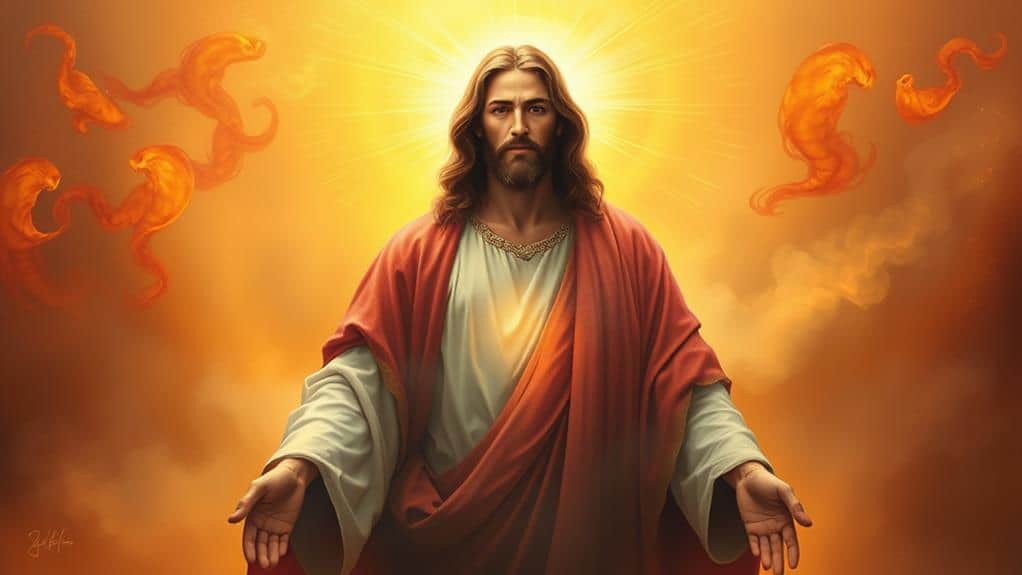As we reflect on the legacy of Prophet Adam, we find a profound foundation for humanity's relationship with the divine. In Islamic tradition, Adam's story imparts timeless wisdom on repentance, humility, and obedience, shaping our understanding of human creation and the divine. His multifaceted role as the first prophet, steward of the earth, and moral guide offers rich insights into human nature and our connection to the divine. We discover a narrative that not only marks the origin of humanity but also illuminates the complexities of sin, redemption, and divine mercy – a legacy that continues to unfold.
Key Takeaways
- Prophet Adam is the foundation of humanity and the first prophet in Islamic teachings, imparting moral guidance on repentance, humility, and obedience.
- Adam's creation narrative illustrates Divine commands shaping human relationships, highlighting the struggle between good and evil, and guiding humanity toward righteousness.
- The legacy of Adam's obedience and redemption serves as a guide for reconciliation and forgiveness in contemporary life, emphasizing the importance of recognizing mistakes and seeking forgiveness.
- Adam's story serves as a common thread highlighting human fallibility across different faith traditions, with divergent views on original sin and implications for humanity.
- Adam's narrative informs understanding of human identity, highlighting vulnerabilities alongside the capacity for growth, and shaping comprehension of the relationship with the divine.
Significance of Prophet Adam
A foundational figure in faith, Prophet Adam holds immense significance in Islamic teachings, symbolizing the father of humanity and serving as the first prophet.
We discover profound wisdom in his narrative, which imparts moral guidance and emphasizes the importance of repentance, humility, and obedience.
Through Adam's identity, we comprehend the Creation narrative and the significance of Divine commands in shaping human relationship with the Almighty.
His moral teachings serve as a foundation for spiritual growth, highlighting the struggle between good and evil.
We recognize Adam's leadership qualities in his role as a prophet, guiding humanity toward righteousness.
As we explore Adam's significance, we gain insight into the spiritual significance of his legacy and its enduring impact on Islamic teachings.
Adam's Role in Human Creation
As we investigate the profound significance of Prophet Adam, we find ourselves drawn to the mysteries of human creation, where Adam's role is pivotal in shaping our understanding of human existence.
We examine the Quranic narrative, which illuminates the divine creation of Adam from clay, marking the beginning of human origins. This account not only highlights Adam's connection to the earth but also underscores the divine purpose behind his creation.
As the first human, Adam's role in human creation is multifaceted, encompassing the aspects of divine stewardship, moral guidance, and the struggles of human existence.
Through Adam's narrative, we gain insight into the intricacies of human nature, our relationship with the divine, and the lasting impact of his legacy on our understanding of human creation.
Life and Teachings of Adam
Delving into the life and teachings of Prophet Adam, we find a rich fabric of wisdom, moral guidance, and spiritual insight that has shaped the understanding of human existence.
Adam's wisdom, imparted through his narrative, emphasizes the importance of repentance, humility, and obedience. His guidance, as the first prophet, has been pivotal in shaping the understanding of sin and repentance.
We can derive the following key aspects from Adam's life and teachings:
- Divine Obedience: Adam's story highlights the importance of obeying divine commandments, illustrating the consequences of disobedience and the value of submission to God's will.
- Moral Guidance: Adam's guidance emphasizes moral values, such as humility and repentance, that are essential for human existence.
- Spiritual Insight: Adam's life provides spiritual insight into the nature of sin, redemption, and divine mercy, offering a profound understanding of human existence.
The Legacy of Adam's Obedience
While examining the life and teachings of Prophet Adam, we notice that his legacy of obedience to divine commandments has profoundly impacted human existence, shaping our understanding of sin, redemption, and divine mercy.
Adam's obedience provides us with moral teachings that serve as the foundation for our spiritual legacy, exerting an enduring influence on humanity's journey. Through his story, we derive essential ethical guidance, faith foundations, and leadership lessons that continue to inspire and guide us.
As we explore Adam's narrative, we recognize the significance of his obedience in establishing a paradigm for human behavior, one that emphasizes the importance of submission to divine will.
Temptation and Disobedience in Paradise
Within the sacred bounds of Paradise, a profound drama unfolded, one that would forever alter the trajectory of human existence.
We witness the pivotal moment when Adam and Eve, tempted by Satan, succumb to the forbidden tree's allure, committing the original sin. This act of disobedience not only changes the course of creation but also reveals fundamental aspects of human nature.
Key Aspects of Temptation and Disobedience:
- The lure of the forbidden: The temptation of the forbidden tree serves as a catalyst for exploring the complexities of human desire and the limits of divine guidance.
- Free will and choice: Adam and Eve's decision highlights the tension between moral lessons and the exercise of free will, underscoring the significance of spiritual growth through ethical choices.
- The consequences of disobedience: This pivotal event sets the stage for understanding the far-reaching implications of sin and the human condition.
Consequences of Adam's Actions
Examining the aftermath of Adam's disobedience, we find that the consequences of his actions are multifaceted and far-reaching.
The Quranic narrative reveals that Adam's choice led to a fall from paradise into earthly existence, introducing human suffering and marking the beginning of sin in the world.
The consequences of disobedience extend beyond Adam and Eve, affecting all humanity and shaping our understanding of sin, repentance, and divine guidance.
As we reflect on the story of Adam, we recognize that his actions demonstrate the significance of obedience to divine teachings and the nature of free will.
Repentance and Divine Mercy
As we reflect on the consequences of Adam's actions, we're reminded that his story doesn't end with disobedience and suffering.
Instead, it unfolds into a narrative of redemption and divine mercy, underscoring the boundless forgiveness of Allah.
This pivotal moment in human history teaches us about the importance of repentance practices in seeking forgiveness and reconciliation with the divine.
Here are three key aspects of repentance and divine mercy as exemplified in Adam's story:
- Sincere Repentance: Adam and Eve's realization of their mistake led to a genuine and heartfelt repentance, seeking Allah's forgiveness as expressed in Quran 7:23.
- Divine Mercy: Allah accepted their repentance, offering guidance and redemption, demonstrating the infinite mercy of the divine towards humanity.
- Hope and Redemption: The narrative of Adam's repentance serves as a beacon of hope for humanity, illustrating the possibility of forgiveness and redemption through sincere repentance practices.
Adam's Redemption and Forgiveness
The narrative of Adam's redemption underscores a profound aspect of Islamic teachings: the possibility of forgiveness and reconciliation with the divine.
As we explore Adam's story, we find that his redemption serves as a paradigm for forgiveness practices in Islam. Through his sincere repentance and Allah's acceptance, we witness the boundless mercy of the divine.
This redemption story emphasizes the significance of recognizing mistakes, seeking forgiveness, and the importance of divine guidance. By examining Adam's journey, we gain insight into the complexities of human fallibility and the nature of sin.
Furthermore, we're reminded of the transformative power of forgiveness and the promise of redemption, underscoring the relevance of Adam's legacy in our lives today. His story serves as a beacon of hope, illuminating the path to reconciliation and forgiveness.
Comparative Religious Perspectives
Diving into the rich fabric of comparative religious perspectives on Prophet Adam, we find a fascinating convergence of narratives that underscore the significance of this foundational figure across faith traditions.
As we explore the stewardship role of Adam, we notice divergent views on original sin and its implications for humanity.
- Common Ancestry: Despite differences in religious interpretations, the story of Adam serves as a common thread, emphasizing human fallibility and the need for divine guidance.
- Prophetic Lineage: Adam's legacy extends beyond his role as the first prophet, as his story informs our understanding of prophetic lineage and the transmission of moral lessons across generations.
- Comparative Narratives: By examining comparative narratives, we gain insight into the ways in which the story of Adam has been retold and reinterpreted across faith traditions, highlighting the complex dynamics between shared heritage and theological divergence.
Key Themes in Adam's Story
We now turn our attention to the rich fabric of key themes in Adam's story, which enlighten our understanding of this foundational figure's role in the Islamic narrative.
At the heart of Adam's story lies the concept of stewardship, underscoring his responsibility to care for the earth. Divinely ordained commandments test Adam's obedience, exposing human fallibility.
Through his experiences, we derive moral guidance, confronting the consequences of sin and the transformative power of repentance. We reflect on the creation narrative, weighing the significance of Adam's surrender to temptation, and the subsequent redemption journey.
Adam's legacy reflects the importance of recognizing one's mistakes and harnessing divine guidance to navigate the human condition. This narrative serves as a model for us, shedding light on the complexities of human nature and our relationship with the divine.
Adam's Impact on Faithful Traditions
Numerous faithful traditions have been profoundly impacted by Adam's legacy, which serves as a cornerstone in the Islamic narrative.
We perceive that his story has shaped the way we comprehend our role in the world and our relationship with the divine. As we reflect on Adam's impact, we're drawn to several key aspects:
- Establishing faithful stewardship: Adam's appointment as Khalifah (successor) on earth underscores the importance of responsible stewardship and care for the planet.
- Providing moral guidance: The narrative of Adam's disobedience and repentance offers significant lessons in moral guidance, emphasizing the consequences of our actions and the importance of seeking forgiveness.
- Informing human identity: Adam's story helps us grasp our human condition, including our vulnerabilities and our capacity for growth, learning, and redemption.
Frequently Asked Questions
Was Prophet Adam Created in God's Image According to Islamic Teachings?
We explore Islamic teachings, finding that Prophet Adam's human creation doesn't imply a divine likeness. Instead, we're created from clay, a distinct form, emphasizing our humility and uniqueness as servants of Allah, our Creator.
What Is the Significance of Adam's Burial Site Near Mount Arafat?
We find profound meaning in Adam's burial site near Mount Arafat, as it symbolizes the culmination of his earthly journey, connecting us to Arafat's rich history and underscoring the significance of this sacred location in our shared heritage.
Did Adam and Eve Have Children Before or After Their Disobedience?
We examine the childbearing timeline of Adam and Eve, considering the disobedience consequences that led to their earthly existence. Scripture suggests they had children after their disobedience, initiating humanity's procreation amidst the challenges of earthly life.
How Does Adam's Story Influence Islamic Views on Environmental Stewardship?
As we reflect on Adam's story, we recognize its profound impact on Islamic views of environmental stewardship, compelling us to adopt sustainable practices and uphold stewardship principles that honor our role as Khalifah, or guardians of the earth.
Are There Any Historical Records of Adam's Existence Outside of Scripture?
We find limited historical evidence of Adam's existence outside of scripture, but ancient texts like the Epic of Gilgamesh and the Book of Enoch offer intriguing parallels to the biblical and Quranic accounts of creation and early humanity.
Conclusion
We've explored the rich legacy of Prophet Adam, examining his pivotal role in human creation, his life and teachings, and his ultimate redemption. Through our analysis, we've distillated key themes – repentance, humility, and the struggle between good and evil – that offer profound insights into the human condition. Adam's narrative has shaped the fabric of humanity, influencing faithful traditions and continuing to impart valuable lessons on sin, forgiveness, and divine mercy. His story remains a testament to the transformative power of faith and obedience.






